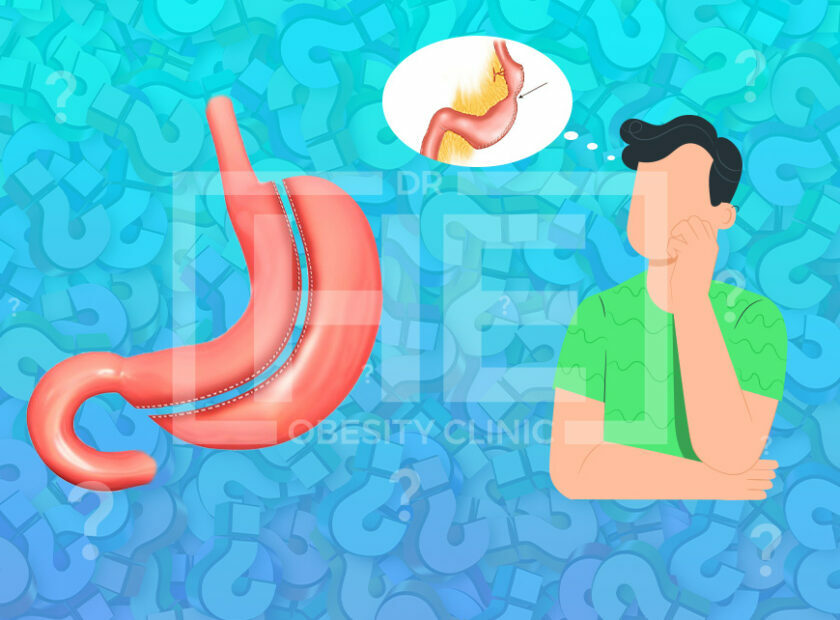
Bad breath after gastric sleeve surgery, How long does bad breath last after gastric sleeve? Why do i have bad breath after gastric sleeve? Bad breath after gastric sleeve surgery, also known as halitosis, can be a common concern for patients. This unpleasant odor can be caused by a variety of factors, including changes in diet, reduced food intake, and the healing process after surgery. One of the main reasons for bad breath after gastric sleeve surgery is the decrease in saliva production, which can lead to dry mouth and an increase in odor-causing bacteria. Additionally, the body’s adjustment to the new stomach size and changes in digestion can also contribute to bad breath. It is important for patients to maintain good oral hygiene, including regular brushing and flossing, as well as staying hydrated to help alleviate dry mouth. Patients should also be mindful of their diet choices and consider incorporating breath-freshening products such as sugar-free mints or gum.
What is gastric sleeve surgery?
Gastric sleeve surgery, also known as sleeve gastrectomy, is a type of bariatric surgery that reduces the size of the stomach by about 80%. This limits the amount of food that can be eaten and helps the patient lose weight. Gastric sleeve surgery is usually performed laparoscopically, meaning that small incisions are made in the abdomen and a camera and surgical tools are inserted through them. The surgery typically takes about an hour and requires general anesthesia.
Bad Breath After Gastric Sleeve
Bad breath after gastric sleeve surgery, after gastric sleeve surgery, some patients may experience bad breath, also known as halitosis. This can be a distressing side effect for individuals who have undergone this weight loss procedure. There are several reasons why bad breath may occur after gastric sleeve surgery.
One of the primary reasons for bad breath after gastric sleeve surgery is a reduction in saliva production. Saliva plays a crucial role in cleansing the mouth and removing food particles and bacteria that can cause odor. Following surgery, some patients may experience a decrease in saliva production, leading to dry mouth and an increased risk of bad breath.
Additionally, changes in diet and eating habits post-surgery can contribute to bad breath. After gastric sleeve surgery, patients are required to follow a strict diet that often involves consuming smaller portions and avoiding certain foods. As a result, the body may enter a state of ketosis, where it burns fat for energy instead of carbohydrates. This metabolic process can lead to the production of ketones, which can cause an unpleasant odor on the breath.
Furthermore, the reduced capacity of the stomach following gastric sleeve surgery can lead to a faster transit time for food through the digestive system. This rapid movement of food can result in incomplete digestion and fermentation in the gut, leading to the release of foul-smelling gases that can contribute to bad breath.
It is essential for individuals experiencing bad breath after gastric sleeve surgery to address this issue with their healthcare provider. In some cases, bad breath may be a sign of an underlying medical condition such as infection or gastrointestinal issues that need to be addressed.
To combat bad breath after gastric sleeve surgery, patients can take several steps to improve oral hygiene and overall oral health. These may include:
1. Maintaining good oral hygiene by brushing teeth and tongue regularly, flossing, and using mouthwash to reduce bacteria in the mouth.
2. Staying hydrated by drinking plenty of water throughout the day to help stimulate saliva production and flush out food particles.
3. Chewing sugar-free gum or sucking on sugar-free mints to stimulate saliva flow and freshen breath.
4. Avoiding foods and beverages that are known to cause bad breath, such as garlic, onions, and coffee.
5. Using oral probiotics to help restore healthy bacteria in the mouth and gut, which can aid in digestion and reduce odor-causing bacteria.
What causes bad breath after gastric sleeve surgery?
Bad breath, also known as halitosis, is an unpleasant odor that comes from the mouth. It can be caused by various factors, such as food, bacteria, dental problems, dry mouth, smoking, and medical conditions. After gastric sleeve surgery, some of the common causes of bad breath are:
Ketosis: Ketosis is a metabolic state in which the body uses fat instead of carbohydrates for energy. This is the goal of gastric sleeve surgery, as it helps the patient lose weight quickly. However, ketosis also produces ketones, which are chemicals that have a fruity or acetone-like smell. Ketones can be detected in the breath, urine, and sweat of the patient, causing bad breath and body odor.
Acid reflux: Acid reflux, also known as gastroesophageal reflux disease (GERD), is a condition in which the stomach acid or bile flows back into the esophagus, causing heartburn, chest pain, and bad breath. After gastric sleeve surgery, the reduced stomach size and increased pressure can cause food to get stuck in the digestive tract, leading to acid reflux.
Stomach problems: Stomach problems, such as indigestion, gastritis, ulcers, infections, or inflammation, can also cause bad breath after gastric sleeve surgery. These problems can affect the digestion and absorption of food, resulting in undigested food particles or bacteria in the mouth or stomach, which produce foul-smelling gases or compounds
Dietary factors: Dietary factors, such as eating too much protein, sugar, or alcohol, can also contribute to bad breath after gastric sleeve surgery. Protein can cause ammonia-like breath, sugar can cause yeast overgrowth and fermentation, and alcohol can cause dehydration and dry mouth. These factors can also affect the pH balance and bacterial flora of the mouth and stomach, leading to bad breath
Oral hygiene: Oral hygiene, such as brushing, flossing, and rinsing, is essential for preventing and treating bad breath. Poor oral hygiene can cause plaque, tartar, cavities, gum disease, and infections, which can harbor bacteria and produce bad breath. After gastric sleeve surgery, oral hygiene may be neglected due to nausea, vomiting, pain, or fatigue, which can worsen bad breath
How to prevent and treat bad breath after gastric sleeve surgery?
Bad breath after gastric sleeve surgery can be prevented and treated by following some simple tips, such as:
Drink plenty of water: Water helps to hydrate the mouth, flush out ketones, dilute acid, and wash away food particles and bacteria. Drinking water frequently can also stimulate saliva production, which helps to cleanse the mouth and neutralize odors.
Eat a balanced diet: Eating a balanced diet that includes fruits, vegetables, whole grains, lean protein, and healthy fats can help to prevent and treat bad breath. Fruits and vegetables can provide vitamins, minerals, antioxidants, and fiber, which can improve digestion and oral health. Whole grains can provide complex carbohydrates, which can prevent ketosis and acidosis. Lean protein and healthy fats can provide essential amino acids and fatty acids, which can support metabolism and immunity.
Avoid odor-causing foods: Avoiding odor-causing foods, such as garlic, onion, spicy foods, dairy products, coffee, and alcohol, can help to prevent and treat bad breath. These foods can leave residues in the mouth or stomach, which can produce bad breath. They can also affect the pH balance and bacterial flora of the mouth and stomach, leading to bad breath.
Practice good oral hygiene: Practicing good oral hygiene, such as brushing, flossing, and rinsing, can help to prevent and treat bad breath. Brushing at least twice a day with a fluoride toothpaste and a soft-bristled toothbrush can help to remove plaque, tartar, food particles, and bacteria from the teeth and gums. Flossing at least once a day can help to clean the spaces between the teeth and under the gum line, where bacteria can hide. Rinsing with an alcohol-free mouthwash can help to freshen the breath and kill bacteria.
Use breath fresheners: Using breath fresheners, such as sugar-free gums, mints, lozenges, or sprays, can help to mask bad breath temporarily. These products can also stimulate saliva production, which can help to cleanse the mouth and neutralize odors. However, these products should not replace good oral hygiene or dental care, as they can only provide short-term relief.
Consult your healthcare team: Consulting your healthcare team, such as your surgeon, dietitian, dentist, or doctor, can help to prevent and treat bad breath. Your healthcare team can assess your individual situation and provide appropriate recommendations, such as medications, supplements, dietary changes, or dental treatments, to address the underlying causes of bad breath. They can also monitor your progress and adjust your treatment plan as needed.
How Long Does Bad Breath Last After Gastric Sleeve?
How long does bad breath last after gastric sleeve? Bad breath after gastric sleeve surgery is a common concern for many patients. This side effect can be distressing, but it is important to understand that it is usually temporary and can be managed with proper care and attention to oral hygiene. In this article, we will discuss the causes of bad breath after gastric sleeve surgery and provide some tips for managing and preventing it.
Causes of Bad Breath After Gastric Sleeve Surgery
There are several factors that can contribute to bad breath after gastric sleeve surgery. One of the main reasons is the changes in diet and eating habits that occur after the surgery. Many patients have to follow a strict liquid or pureed diet in the initial weeks following the surgery, which can lead to a decrease in saliva production. Saliva plays a crucial role in cleaning the mouth and removing food particles, so a reduction in saliva can result in an increase in bacteria and the production of foul-smelling compounds.
Additionally, the rapid weight loss that occurs after gastric sleeve surgery can also contribute to bad breath. When the body burns fat for energy, it produces ketones, which can have a strong, unpleasant odor when exhaled.
Tips for Managing and Preventing Bad Breath
1. Maintain Good Oral Hygiene: Brushing your teeth at least twice a day and flossing regularly are essential for preventing bad breath. Consider using a tongue scraper to remove bacteria and food debris from the surface of your tongue.
2. Stay Hydrated: Drinking an adequate amount of water is important for maintaining saliva production and keeping your mouth moist. Aim to drink at least 8-10 glasses of water per day.
3. Choose Breath-Friendly Foods: Certain foods, such as onions, garlic, and spicy foods, can contribute to bad breath. Opt for breath-friendly foods like apples, carrots, and celery, which can help clean your teeth and freshen your breath.
4. Use Sugar-Free Gum or Mints: Chewing sugar-free gum or sucking on sugar-free mints can help stimulate saliva production and mask bad breath temporarily.
5. Visit Your Dentist Regularly: Regular dental check-ups and cleanings are crucial for maintaining good oral health and addressing any issues that may contribute to bad breath.
6. Monitor Your Protein Intake: High-protein diets are common after gastric sleeve surgery, but they can also contribute to bad breath. Be mindful of your protein intake and consider incorporating more plant-based proteins into your diet.
7. Be Mindful of Medications: Some medications can cause dry mouth as a side effect, which can contribute to bad breath. If you are taking any medications, discuss this with your healthcare provider to see if there are alternatives that may have less impact on your oral health.
It is important to note that if bad breath persists or is accompanied by other symptoms such as pain, fever, or discharge, it is important to consult with your healthcare provider as it could be a sign of an underlying issue that needs to be addressed.
Why do i have bad breath after gastric sleeve?
Why do i have bad breath after gastric sleeve? Bad breath after gastric sleeve surgery, also known as halitosis, can occur due to a variety of reasons. One of the primary causes of bad breath after gastric sleeve is the change in dietary habits and the way the body processes food after the surgery. After gastric sleeve surgery, the stomach is reduced in size, which means that food is not processed in the same way as before. This can lead to food particles being left in the stomach for longer periods of time, which can cause bad breath.
Another reason for bad breath after gastric sleeve surgery is dehydration. Many patients experience a decrease in their water intake after the surgery, which can lead to dry mouth. A dry mouth provides an ideal environment for bacteria to thrive, leading to bad breath.
In addition, the rapid weight loss that occurs after gastric sleeve surgery can also contribute to bad breath. When the body burns fat for energy, it produces ketones, which can cause an unpleasant odor on the breath.
Furthermore, some patients may experience gastrointestinal issues such as acid reflux or gastroesophageal reflux disease (GERD) after gastric sleeve surgery. These conditions can lead to an increase in stomach acid, which can contribute to bad breath.
It is important for patients who have undergone gastric sleeve surgery to be mindful of their oral hygiene and hydration. Drinking an adequate amount of water and practicing good oral hygiene, including regular brushing and flossing, can help alleviate bad breath. Additionally, incorporating foods that are less likely to cause bad breath, such as fruits and vegetables, into the diet can also be beneficial.




